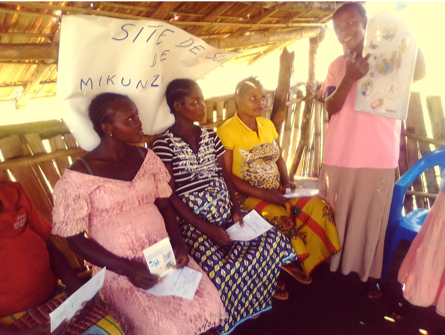Long distances between homes and health facilities made it nearly impossible for pregnant women in some areas of the Democratic Republic of the Congo (DRC) to receive the care they needed to protect themselves and their unborn babies from malaria. That’s where community health workers (CHWs), supported by the Transforming Intermittent Preventive Treatment (IPTp) for Optimal Pregnancy (TIPTOP) project, and midwives like Rosette Mukingu and Rebecca Kayengo come in. These trained health care providers bring care to women’s communities, helping to ensure malaria-free pregnancies and healthy babies.

Photo: Michée Mitondo, Kenge District
The Jhpiego-led TIPTOP project aims to significantly reduce malaria during pregnancy through the community distribution of sulfadoxine-pyrimethamine (SP). TIPTOP has supported the DRC Government to increase access to quality-assured SP and reduce missed opportunities for pregnant women eligible to receive this preventive treatment. Since 2018, the community IPTp approach has been implemented in the DRC in Kenge, Kunda and Bulungu Districts.
By expanding access to quality-assured SP through community IPTp, TIPTOP has seen increases in IPTp uptake in the DRC. Increasing the number of pregnant women receiving at least three doses of IPTp is expected to contribute to reduced maternal and neonatal mortality and lower incidence of low-birthweight babies in project areas.
Early antenatal care (ANC) initiation has also increased, while attendance at four ANC visits (ANC4) has remained steady. However, there is always room to improve and TIPTOP, along with the DRC Ministry of Health (MOH), explored ways to increase the number of pregnant women attending four ANC visits.
The Gabia health center is in a health area of the Kenge health zone. In this health area, ANC is only provided at the health facility and is not available in the more rural and remote health posts. Because of its location, only 4.9% of pregnant women from the Mikunzi health area and throughout the Kenge health zone have easy access to the health facility for antenatal consultation.
An analysis of CHW reports by the Gabia health center team confirmed that the number of pregnant women completing four ANC visits was low. The TIPTOP team, in conjunction with the MOH, looked at the issue more closely and determined that many pregnant women who were receiving SP from a CHW had difficulty going to the health facility for follow-up ANC visits because of the long distances they had to travel. To address this issue, the DRC MOH is working with the World Bank to pilot ANC outreach efforts.
Now, midwives Mukingu and Kayengo bring their services closer to the women they serve by providing ANC in the communities. TIPTOP CHWs and community leaders mobilize pregnant women to access ANC through outreach sites, which has helped to reach women early in their pregnancies and increase ANC follow-up visits.
Pregnant women from the Mikunzi health area value these outreach efforts:
We thought we were abandoned by the health care providers, but today it is a great joy to see them among us. If this had started a long time ago, many of us would not have had to give birth at home and lose their lives or their babies. Courage to our midwives and CHWs. Do not abandon us.”
Community IPTp through the TIPTOP project increased IPTp coverage in the DRC without negatively impacting ANC4 rates. Household survey data shows an increase in IPTp3+ from 21.8% to 61.9% in Kenge District between baseline in April, 2018 and midline in October, 2019. Thanks to strong community involvement, targeted communication and coordination between TIPTOP CHWs and the MOH/World Bank to mobilize pregnant women to access ANC, the number of pregnant women attending four ANC visits exceeded 2020 project targets despite COVID-19, and is contributing to improved maternal and newborn health outcomes.
Joseph Ekandji is a malaria senior technical advisor and Michée Mitondo is a community officer at Jhpiego with the TIPTOP project.
Photo: Michée Mitondo, Kenge District



